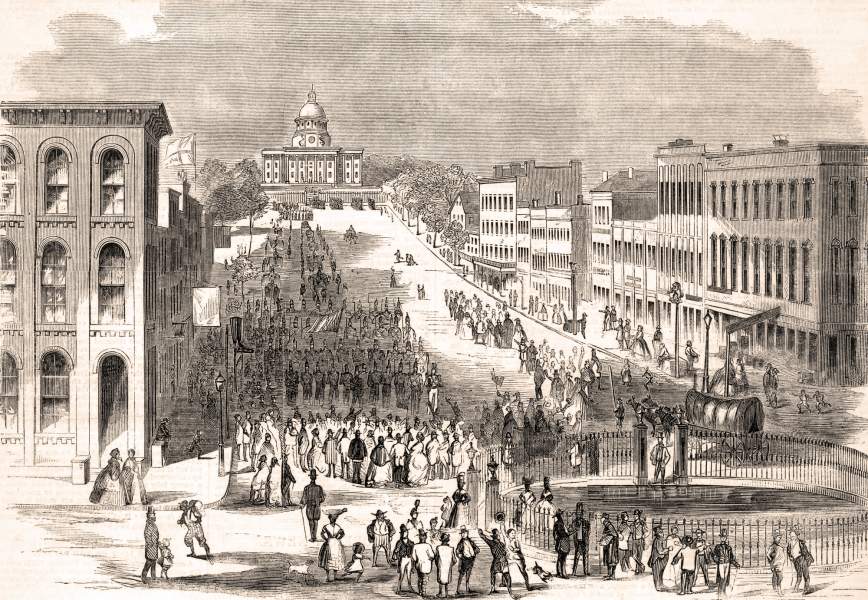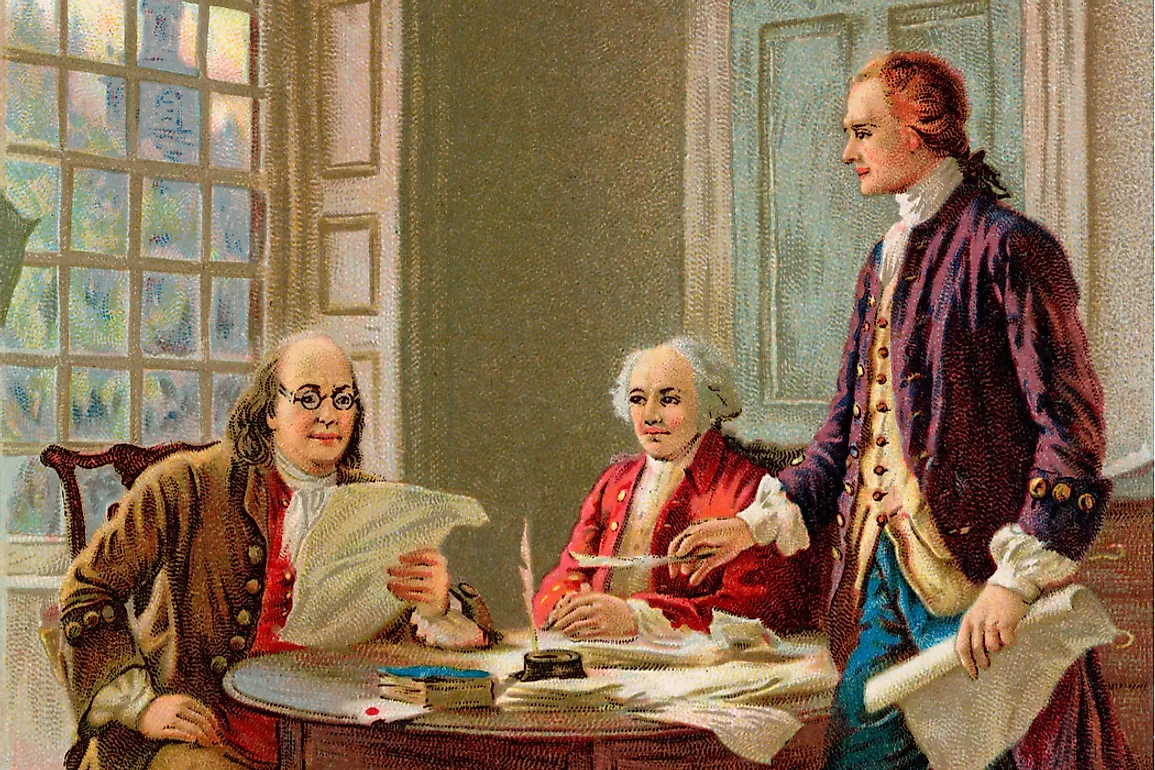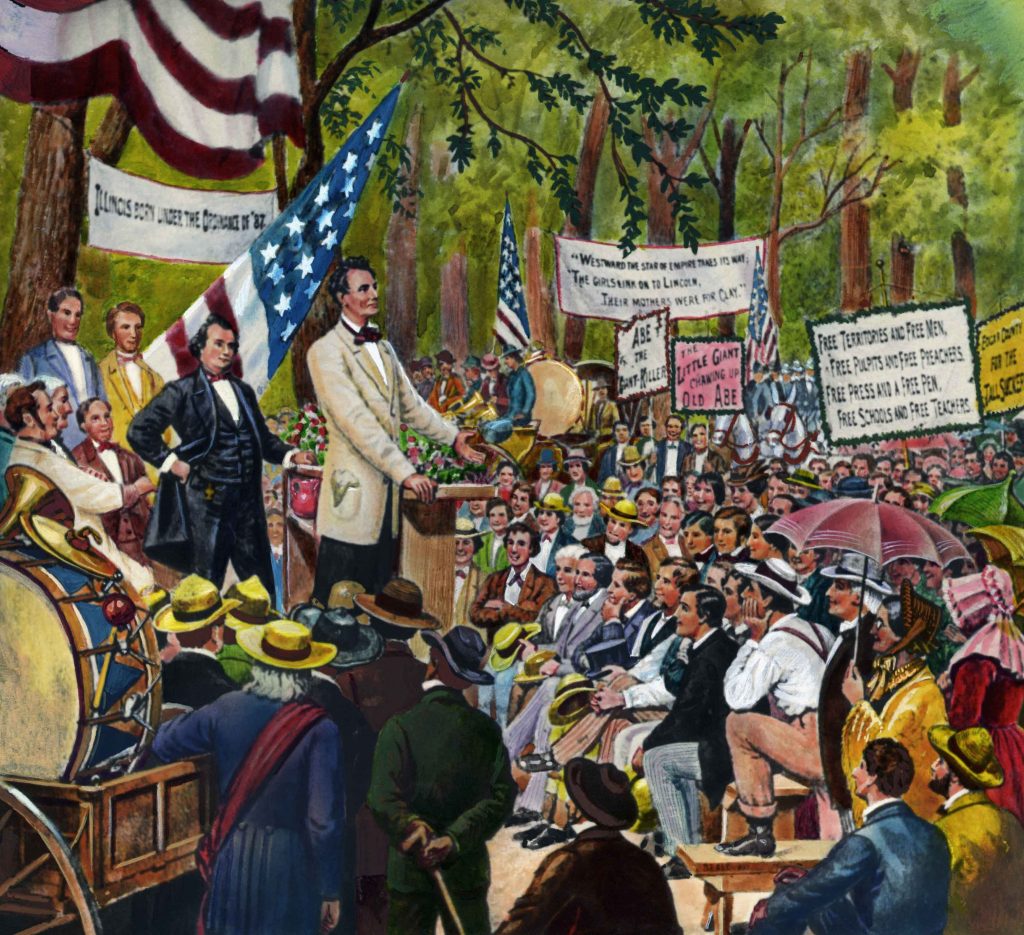To: BroJoeK
Unlike the Confederate constitution -- framed in Montgomery, Alabama starting on February 7, 1861 -- the US 1787 Constitution never mentions slaves or slavery by name. Our Founders went to great lengths to avoid saying directly what they intended, suggesting they knew full well slavery was so wrong it must not be called by its proper name. So, they wanted to bury the corpse of slavery under a matting of obfuscatory words.The Confederate Constitution adopted on March 11, 9 days after the Corwin Amendment, does explicitly use the word "slavery" while the US constitution tap dances around it while referring to it several times. So what?
Unlike the 1861 Confederate constitution, the US 1787 Constitution does not allow exceptions in laws abolishing imports of slaves from other countries.,
All the Confederate constitution allowed was importation from the very same states...ie from the US....from which slaves had been able to be traded prior to secession. It was no different from the situation that existed prior to secession. You know what one key difference was? The Confederate Constitution banned the importation of slaves from the rest of the world immediately. The US Constitution allowed for the importation of slaves for another 20 years after ratification. The Confederate Constitution was stricter in its ban on the slave trade.
Unlike the 1861 Confederate constitution, the US 1787 Constitution does not prohibit outlawing slavery.
This only applied to the Confederate Government not to the state governments. Once again, this was an explicit spelling out of the situation that existed in the US prior to secession. The US Federal government also had no power provided to it in the US Constitution to force a state to abolish slavery.
Now, to a normal person reading this, it seems pretty clear that the Confederate constitution outlaws abolishing slavery,
Oh that seems far from clear. The Confederate Constitution applied to the central government, not to the states. That was the same understanding everyone had about the US Constitution. It only contained restrictions on the power of the federal government.
but our pro-Confederates here respond with two arguments: This provision only prohibits the Confederate Federal government from abolishing slavery, it does not prohibit states from abolishing slavery. States, our pro-Confederates claim, were still free to abolish slavery if they wished. Corwin, Corwin, Corwin, Corwin, Corwin! The CSA constitution, they claim, only says exactly what Corwin said: "No amendment shall be made to the Constitution which will authorize or give to Congress the power to abolish or interfere, within any State, with the domestic institutions thereof, including that of persons held to labor or service by the laws of said State.[2][3]" Northern Doughfaced Democrat Pres. Buchanan, signed Corwin Amendment after unanimous Democrat votes for it. However, we should notice the historical timeline here: February 7, 1861 -- the Confederate Secession Convention in Montgomery, Alabama, began work on their new Confederate constitution. It was completed on March 11, 1861. February 28, 1861 -- Ohio Republican Congressman Corwin submitted his proposed amendment. It barely passed with 100% Democrat support and majority Republican opposition and was signed by Democrat Pres. Buchanan on March 4. So it appears to me that the Confederate constitution came first and Corwin was simply hoping to match what Confederates were already guaranteeing. Corwin was ratified by just two of five Union slave states and three of 18 Union free states -- nowhere near the 3/4 required. In 1864 Ohio rescinded its ratification and Maryland voted to abolish slavery on its own.
Here are some other facts: Republicans introduced the Corwin Amendment to each house of Congress. Plenty of Republicans voted for the passage of it - which it did pass with the necessary 2/3rds supermajority. It could not have passed without substantial Republican support.
Its drafting was orchestrated....yes that is the correct word....ORCHESTRATED as Doris Kearns Goodwin went to considerable pains to point out in Team of Rivals...by Lincoln himself.
It was ratified by multiple Northern states even after the war started.
It was introduced on March 2 while the Confederate Constitution was not approved until March 11. So the Corwin Amendment came first. The timeline is indeed important
Unlike the 1861 CSA constitution, the 1787 USA Constitution makes no guarantees of a "right of sojourn" with slaves. In contrast, the CSA constitution says: "Article IV Section 2(1) The citizens of each State shall be entitled to all the privileges and immunities of citizens in the several States; and shall have the right of transit and sojourn in any State of this Confederacy, with their slaves and other property; and the right of property in said slaves shall not be thereby impaired.[31]" Crazy Roger Taney's insane 1857 misinterpretations of our Founders' Original Intentions: To which our pro-Confederates respond: that's just what the SCOTUS 1857 Dred Scot ruling provided. However, the fact is that no Founder in 1787 would have interpreted their new US Constitution the way Crazy Roger Taney did in 1857.
The fact remains that this was the majority opinion of the SCOTUS, not just the opinion of Chief Justice Taney.
The fact also remains that there is no way you can show that no Founding Father would have agreed with the SCOTUS' opinion in Dred Scott. None of the Founders said anything about the issue - unless you can provide us a quote from each of the Founding Fathers showing otherwise.
Unlike the 1861 CSA constitution, the 1787 US Constitution did not forbid Congress from outlawing slavery in US territories. Indeed, the US Congress had outlawed slavery in the Northwest Territories in 1787, so that was clearly intended by our Founders. The CSA constitution says, regarding territories: "Article IV Section 3(3) -- In all such territory, the institution of negro slavery as it now exists in the Confederate States, shall be recognized and protected by Congress, and by the territorial government: and the inhabitants of the several Confederate States and Territories, shall have the right to take to such territory any slaves lawfully held by them in any of the states or territories of the Confederate states.[32]" Again, this was Crazy Roger's ruling in Dred Scott, but it had nothing to do with our Founders' original intentions. The three-fifths clauses of both constitutions are almost identical, except for Confederates' use of the words, "three-fifths of all slaves".
And as the SCOTUS ruled in Dred Scott, the US Federal government could not outlaw slavery in US territories either. So any such law was in fact unconstitutional in the US. You are free to disagree with the SCOTUS but that was the law of the land. Furthermore, there is no way you can prove that was not the Founding Fathers' intent.
The fugitive slave clauses of both constitutions are identical, because for once Confederates decided to use our Southern Founders' euphemistic language instead of their own more blunt words regarding fugitive slaves.
It is identical because the Confederate Constitution is in many parts identical just as the US Constitution was in many parts identical to the Articles of Confederation. The Confederate Constitution did not treat slavery differently than how the US Constitution did prior to secession.
Bottom line: your favorite word, "enshrined", is indeed the proper word for slavery in the 1861 CSA constitution, but not in the 1787 US Constitution.
Bottom line: The Confederate Constitution was more honest in explicitly using the word "slavery" while both protected it equally.
Instead, our Founders in 1787 hoped to "bury", "entomb" and/or "embalm" slavery, as best they could at that time.
The 1787 Constitution tap danced around/obfuscated when referring to slaves instead of explicitly saying the word while providing protections for slavery that were identical to those in the Confederate Constitution - expect the 1787 Constitution allowed 20 more years of the African Slave Trade while the Confederate Constitution banned it immeditately.
To: FLT-bird; jeffersondem; marktwain; x; DiogenesLamp; TexasKamaAina; HandyDandy
FLT-bird:
"The Confederate Constitution adopted on March 11, 9 days after the Corwin Amendment..."February 7, 1861, secessionists in Montgomery, Alabama
began work on their new Confederate constitution.
 February 7, and since for 90% of it, all they did was copy and paste the 1787 US Constitution, we have to believe that most of the serious work was completed in a day or two.
February 7, and since for 90% of it, all they did was copy and paste the 1787 US Constitution, we have to believe that most of the serious work was completed in a day or two.
Then, it took a few weeks to discuss and print the final version for adoption on March 11.
Since December 1860, the US Congress had been dealing with many different proposals for "compromise" laws & amendments, hoping to stop further secessions.
On February 28, long after the new Confederate constitution was all but completed, Congressman Corwin proposed an amendment to the US Constitution which matched rather well the Confederate:
CSA Article I Section 9(4) "No bill of attainder, ex post facto law, or law denying or impairing the right of property in negro slaves shall be passed."
FLT-bird:
"...does explicitly use the word "slavery" while the US constitution tap dances around it while referring to it several times.
So what?" It well illustrates my point, since even in 1861 the US Congress' proposed Corwin Amendment simply repeated a circumlocution from our 1787 Constitution:
proposed Corwin: "No amendment shall be made to the Constitution which will authorize or give to Congress the power to abolish or interfere, within any State, with the domestic institutions thereof, including that of persons held to labor or service by the laws of said State."
Our Founders in 1787 well understood that slavery was wrong and disgraceful, should not be mentioned directly in their Constitution and so must be addressed through circumlocutions and euphemisms.
Such squeamishness was completely gone in secessionists' 1861 Montgomery constitution.
FLT-bird: "The US Constitution allowed for the importation of slaves for another 20 years after ratification.
The Confederate Constitution was stricter in its ban on the slave trade."
The 1861 Confederate Constitution allowed for a major exception, which is not found in the 1787 US Constitution.
I would not call that "stricter".
FLT-bird quoting BJK: "Unlike the 1861 Confederate constitution, the US 1787 Constitution does not prohibit outlawing slavery."
FLT-bird: "This only applied to the Confederate Government not to the state governments.
Once again, this was an explicit spelling out of the situation that existed in the US prior to secession.
The US Federal government also had no power provided to it in the US Constitution to force a state to abolish slavery."
So you claim here, but the Corwin Amendment was intended to directly address your point, thus rather strongly implying the absence of such a guarantee in our Founders' original 1787 Constitution -- at least as perceived by Southern slaveholders.
FLT-bird quoting BJK: "Now, to a normal person reading this, it seems pretty clear that the Confederate constitution outlaws abolishing slavery..."
FLT-bird: "Oh that seems far from clear.
The Confederate Constitution applied to the central government, not to the states.
That was the same understanding everyone had about the US Constitution.
It only contained restrictions on the power of the federal government."
There are several more points to be made here:
- You are unwilling to draw this same distinction between Federal and state authority regarding the proposed Corwin Amendment, which you insist would have ended abolition forever in the USA.
- This suggests the distinction between Federal and state authorities was not so well established in Confederate minds as you'd have us believe here.
- But more important, the CSA constitution itself directly restricts states authority over slavery in Article IV -- Sections 2(1) and 3(3), such that, using Crazy Roger Taney's logic, it would be impossible for any Confederate state to pass laws even restricting slavery, much less abolishing it.
- This means your implied claims, that the 1861 CSA Constitution was effectively "slavery neutral" for states, are pure undiluted hogwash.
FLT-bird:
"Here are some other facts: Republicans introduced the Corwin Amendment to each house of Congress.
Plenty of Republicans voted for the passage of it - which it did pass with the necessary 2/3rds supermajority.
It could not have passed without substantial Republican support." The key fact which you refuse to acknowledge, is that a majority of Republicans in Congress opposed Corwin, while 100% of Democrats supported it, and Democrat Pres. Buchanan signed it!
The key fact which you refuse to acknowledge, is that a majority of Republicans in Congress opposed Corwin, while 100% of Democrats supported it, and Democrat Pres. Buchanan signed it!
That should cause you to pause and reflect, but since it doesn't comply with your Lost Cause propaganda, you simply ignore the most important fact.
FLT-bird on Dred Scott: "The fact remains that this was the majority opinion of the SCOTUS, not just the opinion of Chief Justice Taney."
Sure, and as we've reviewed before, 100% of the seven concurrences (including Crazy Roger himself) were Democrats, and five of those seven were Southern Democrats, while the other two concurrences were Northern Doughfaced Democrats -- Nelson from NY and Grier from PA.
The two dissenters were Republicans -- Curtis from MA and McLean from Ohio.
So Dred Scott's concurrences in no way prove that Crazy Roger was sane, rather they prove that all Democrats were (and many remain) equally insane.
FLT-bird: "The fact also remains that there is no way you can show that no Founding Father would have agreed with the SCOTUS' opinion in Dred Scott.
None of the Founders said anything about the issue - unless you can provide us a quote from each of the Founding Fathers showing otherwise."
Of course we do have many quotes from Founders on related subjects, beginning with this one from Jefferson, Franklin and Adams: 
"We hold these truths to be self-evident, that all men are created equal, that they are endowed by their Creator with certain unalienable Rights, that among these are Life, Liberty and the pursuit of Happiness.--That to secure these rights, Governments are instituted among Men, deriving their just powers from the consent of the governed..."
And there are many similar quotes from virtually every Founder, all of them strongly suggesting that Crazy Roger Taney, and all Southern Democrats, if not all Democrats, had, by 1857 turned into stark raving lunatics.
FLT-bird: "And as the SCOTUS ruled in Dred Scott, the US Federal government could not outlaw slavery in US territories either.
So, any such law was in fact unconstitutional in the US.
You are free to disagree with the SCOTUS but that was the law of the land.
Furthermore, there is no way you can prove that was not the Founding Fathers' intent."
No Northerner accepted Crazy Roger's Dred Scott opinions as legitimate, for one reason, as Lincoln said in 1858: 
"We shall lie down pleasantly dreaming that the people of Missouri are on the verge of making their State free; and we shall awake to the reality, instead, that the Supreme Court has made Illinois a slave State."
It's a major factor in turning previously Democrat states of Pennsylvania, Indiana and Illinois to Republicans in 1860.
As for proving our Founders' intentions, I have proved those with one quote from the DOI above, and could add many more similar, if you still don't "get" it.
FLT-bird: "The Confederate Constitution did not treat slavery differently than how the US Constitution did prior to secession."
Only if you agree with the US 1787 Constitution, as grossly distorted by Crazy Roger Taney's 1857 lunatic opinions.
144 posted on
05/08/2024 3:59:13 AM PDT by
BroJoeK
(future DDG 134 -- we remember)
FreeRepublic.com is powered by software copyright 2000-2008 John Robinson
 February 7, and since for 90% of it, all they did was copy and paste the 1787 US Constitution, we have to believe that most of the serious work was completed in a day or two.
February 7, and since for 90% of it, all they did was copy and paste the 1787 US Constitution, we have to believe that most of the serious work was completed in a day or two. The key fact which you refuse to acknowledge, is that a majority of Republicans in Congress opposed Corwin, while 100% of Democrats supported it, and Democrat Pres. Buchanan signed it!
The key fact which you refuse to acknowledge, is that a majority of Republicans in Congress opposed Corwin, while 100% of Democrats supported it, and Democrat Pres. Buchanan signed it!
